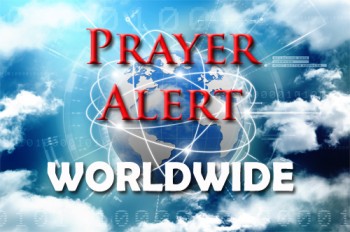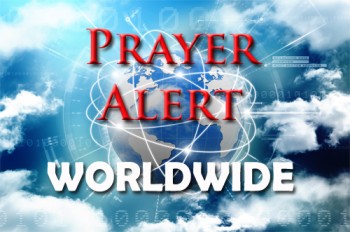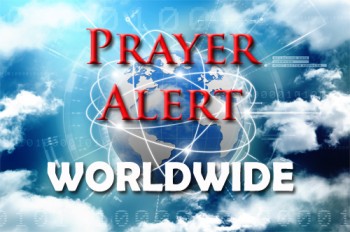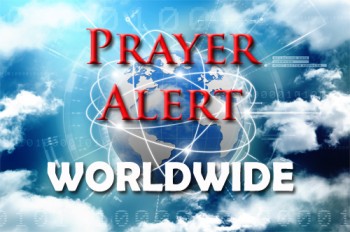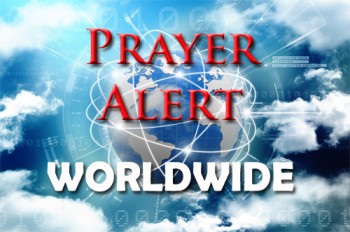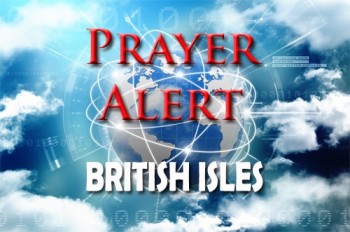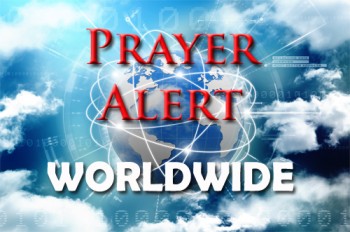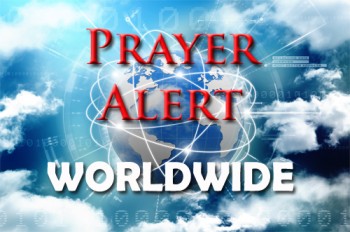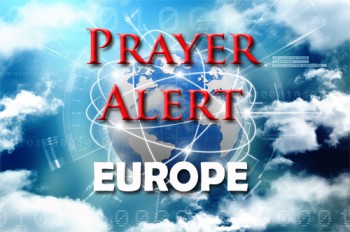
Displaying items by tag: Christians
Asia and Africa: change and conflict
In Algeria and Sudan, peaceful protesters are continuing to demand genuine change, but the military - the most powerful institution in both countries - resist the calls. Both countries know that ousting an authoritarian leader is no guarantee of reform. In each case, Christian communities have added their voices to the calls for greater democracy and transparency. In the Holy Land, recent violence saw Islamic militants from Gaza launch 600+ rockets into Israel, and Israel responding with a heavy bombardment. Both sides eventually agreed a ceasefire, which is currently holding, but the UN envoy to the Middle East warned on 13 May that the risk of another war ‘remains imminent’. Half the Christian population has returned to Iraq following the collapse of IS, but they are returning to broken towns and Iran-backed militias in the Nineveh area. The search for peace, good governance, fairness, justice and dignity continues.
India: ‘murder’ by prayer
Three Christians stood in disbelief as police clapped them in handcuffs. They went to jail, simply for praying for a sick woman. Surjan, Kolah and Krishna had not been openly sharing the gospel in the streets, which would draw persecution. They had simply prayed for the sick wife of a friend. But the woman died, and the villagers blamed the three Christians who had prayed for her. 27-year-old Krishna had only been a Christian for a month. What would prison do to his young faith? In prison, guards called the three men ‘Hallelujah people’ because they met every morning for prayer and to encourage each other. As months passed, they shared the gospel with fellow prisoners. Thirteen became Christians. After eleven months a lawyer was able to get them released on bail. But they still face a trial. They may yet face a term in in prison for the crime of ‘murder’ by prayer.
Pakistan: Christian bride trafficking
Muqadas was 16 when her parents married her off to a Chinese man looking for a bride. A few months later, Muqadas is back home, pregnant, and seeking a divorce from an abusive husband. Hundreds of poor Christian Pakistani girls have been trafficked to China in a bride market that has swiftly grown since last year. Brokers aggressively seek girls for Chinese men, sometimes cruising outside churches to look for potential brides. They are being helped by Christian clerics paid to target impoverished parents in their congregation with promises of wealth in exchange for their daughters. Parents receive several thousand dollars and are told that their new sons-in-law are wealthy Christian converts - but this is not true. The Chinese government and its embassy in Pakistan are accused of turning a blind eye to the practice by issuing visas and documents without question.
Middle East: Holy Week
Christians across the Middle East are now experiencing or preparing for Holy Week (those churches that follow the Eastern Christian calendar being a week behind the West). Streets and squares overflow with believers celebrating Palm Sunday in Erbil, Iraqi Kurdistan, and Iraqi Christian towns in the Nineveh Plain, along with believers in Lebanon and the Holy Land. Thus they demonstrate the deep faith of the region’s Christians as they worship a Saviour who showed strength through love, service and sacrifice.
‘Standing Together’ against knife crime
Responding to recent publicity about knife crime and its devastating consequences, British churches, Christian charities, and voluntary organisations worked jointly to host Standing Together, a public rally against knife crime and youth violence, in Trafalgar Square on 6 April. It was initiated by the Ascension Trust (creators of Street Pastors in 2003). The general secretary of Churches Together in Britain and Ireland said that we, the Church, must recognise that knife crimes and violence have been ruining lives for decades. ‘Standing Together’ is encouraging churches from all Christian traditions and denominations in Britain and Ireland to ‘begin their engagement, or redouble their efforts, to combat serious youth violence’. Churches have much to offer in terms of prayer, expertise, volunteers, and resources such as buildings and equipment. May this event launch even more faith in action on our streets.
US / Mexico: Christians call for border reforms
An international Christian delegation went to the Mexico-US border and witnessed first-hand the situation being faced by those seeking asylum and refuge. They are now calling for the dismantling of walls, borders and facilities that contribute to dehumanisation, exclusion, isolation and victimisation of people. They want nations to enact laws that account for human dignity, human rights, righteousness and compassion. The delegates will take their message to Washington, where they will join other Christians at an ecumenical advocacy event. Meanwhile a group of Mexican churches, together with the Theological Community of Mexico, are providing pastoral and psychological support to the people who make a stop in Mexico City. Churches in the USA are providing legal counsel to those seeking sanctuary and asylum, and offering their houses of worship as sanctuaries. Pray for radical reforms that address the causes of migration and the way in which migrants are treated on their journey.
Two Christian Iranians refused asylum
An Iranian man seeking refuge in the UK has had his claim refused by the Home Office who wrote to say that his decision to convert to what he described as ‘peaceful’ Christianity and to leave Islam because ‘there is violence, rage and revenge’ was inconsistent. The letter quotes verses from Exodus, Matthew and Revelation as examples ‘inconsistent with a peaceful religion’. Recently an Iranian woman was rejected because the assessor believed her ‘faith was half-hearted' and did not think she was a true believer. She was mocked for admitting Jesus could not protect her from the country's tyrannical regime. The Bishop of Durham asked how a government official can arbitrarily pick bits out of a holy book and use them to trash someone's heartfelt reason for coming to a personal decision to follow another faith. See https://www.dailymail.co.uk/news/article-6844623/ANOTHER-Christian-asylum-claim-rejected-official-questioned-faith.html
Syria: Christians face uncertain future
Many Christians have fled Syria’s violence. Before 2011 Christians made up 8-10% of a 22 million population. By 2017 80% of them had left. Pastor Abdallah chose to stay and care for his congregation. He said that there are questions around the fate of kidnapped Christians, including three members of his church. The media focus on the disappearance of high-profile church leaders, but many ordinary Christians were abducted or disappeared during IS occupation. Hope is that more will become known about their situation soon. They could have been moved outside the area. As pastor Abdallah helps the Aleppo community rebuild, his main problem is securing long-term funding. NGOs are stopping aid throughout Syria, and many are suffering. He has now heard that banks have stopped transfers, and he said that the media don’t shed much light on the difficult situation citizens are enduring.
Eritrea: 32 Christians arrested in March
This month Eritrean police have arrested 32 Christians in the capital, Asmara, including a newlywed couple and ten of their guests. Eritrea’s human rights record was recently condemned at the UN Human Rights Council. A UN monitoring group said thousands of Christians are facing detention, as ‘religious freedom in Eritrea continues to be denied’. The council also heard that Eritrea’s claims of improvement in the human rights were unfounded. In 2002 Eritrea introduced a law prohibiting Christian practice outside the Orthodox, Catholic and Evangelical Lutheran denominations, and Sunni Islam.
East-West (mis)-understandings
Romania’s presidency of the EU Council comes at an awkward time. Brexit looms in a matter of weeks. Populist parties threaten to gain seats in European parliamentary elections in May. Sharp differences separate eastern and western European countries on migration policies. Romania’s justice minister has drafted an emergency decree to allow politicians to overturn corruption convictions, including the head of the country’s biggest political party; none of which contributes to a climate of optimism. Yet there are opportunities for better East-West understanding among Christians concerned with the future of Europe. Preparations are well under way for the State of Europe Forum, to be held in Bucharest on or around Europe Day, 9 May. It will promote biblical perspectives in the discussions among participants representing a broad spectrum of Christian backgrounds and disciplines from across Europe.

